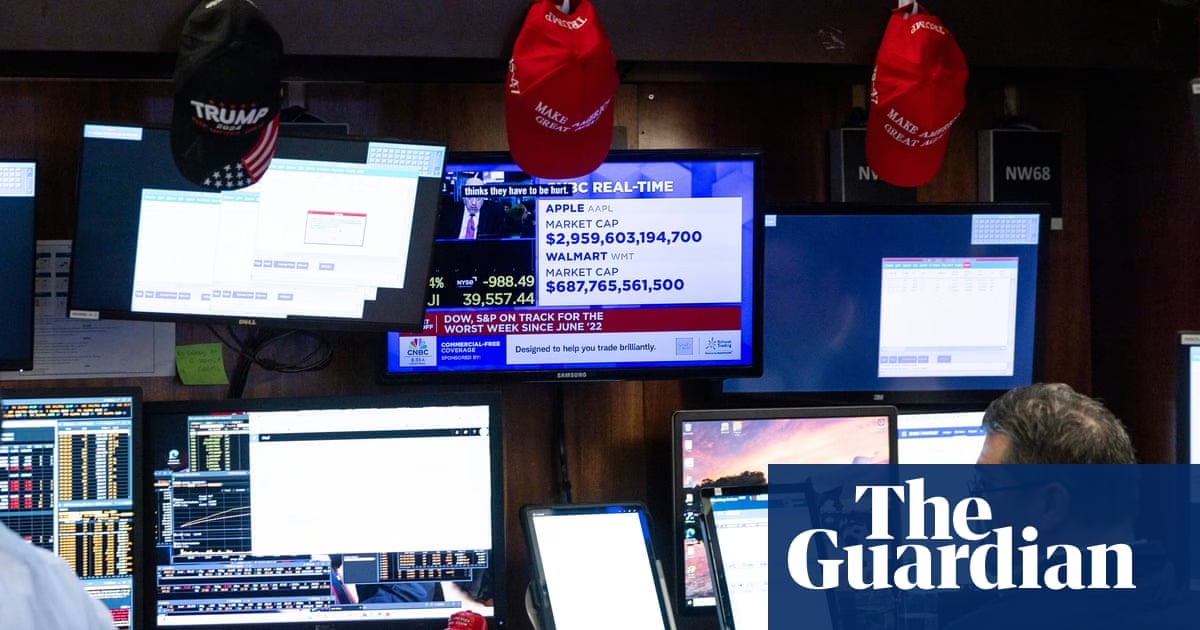<
div>
Investors are bracing themselves for another tumultuous week as some of Donald Trump’s most stringent tariffs take effect, and global leaders consider retaliatory measures, exacerbating global recession fears.
Last week, stock markets saw plummeting indices of nearly $5tn, with losses in the UK and US not observed since the early pandemic days of Covid-19, as traders sought shelter from what appeared to be the opening shots of a global trade war.
With no indication that the Trump administration would scale back its so-called “liberation day” tariffs, analysts foresee ongoing market turbulence and an increased likelihood of recession in the US, UK, and European Union.
Roman Ziruk, a senior market analyst at the global financial services firm Ebury, stated, “Volatility is likely to remain elevated as we progress into the week.”
He noted that some investors still hold out hope that tariffs against China and the European Union, set to commence from Wednesday, might be delayed or revamped.
“However, we cannot overlook the danger of trade tension escalation, particularly as China’s response to the latest US tariffs has been more forceful than before,” Ziruk said.
Yet senior figures in the Trump administration cautioned against expectations of a U-turn. Howard Lutnick, the commerce secretary, stated in a televised interview that Trump aims to “reset global trade”.
EU leaders are deliberating their response, while Keir Starmer, the UK prime minister, has promised to “shelter” British businesses from tariff impacts, signaling intentions to announce mitigation strategies this week.
Potentially pursuing an economic reset, Starmer may reconsider Labour’s pledge against tax increases amidst a global trade deceleration.
Treasury minister Darren Jones claimed the globalization era is over but remained hopeful for a trade agreement with the White House on Sunday. The 10% tariff rate on the UK is among the lowest worldwide, except for Russia, North Korea, Belarus, and Cuba, which were exempt from the global trade dispute.
But Trump has already levied a 25% tariff on UK steel and cars. This caused Jaguar Land Rover to halt exports to America, a market that buys approximately a quarter of the company’s annual sales of 400,000 vehicles.
Economic forecasters caution that the scope and severity of the tariffs could still steer the UK economy into decline. Analysts at Barclays anticipate recession risks for the UK and the EU in the second half of the year and revised their growth forecasts downward for both economies, as well as the US.
China has already enacted retaliatory tariffs, but George Magnus, an expert on China’s economy, believes a trade deal in the long term is still feasible. Both Trump and China’s President Xi Jinping might avoid a full trade war due to internal pressures and the potential economic fallout.
Musk, the world’s wealthiest man, who has emerged as Trump’s leading ally in global business, expressed a hope for a tariff-free “free-trade zone” between the EU and US.
From Wednesday, tariffs of 20% will be imposed on Europe, and 34% for China, which is the world’s leading exporting country, along with others such as Japan and Vietnam labeled by the White House as among the “worst offenders”.








